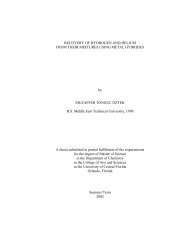You also want an ePaper? Increase the reach of your titles
YUMPU automatically turns print PDFs into web optimized ePapers that Google loves.
2.2.1.1. Hydriding and Dehydriding Procedures<br />
Samples for hydriding trials were prepared by loading 100 to 300 milligrams of<br />
sample into sample boats under an argon atmosphere in the glove box. The boats were<br />
transferred to the DSC after the furnace temperature had been adjusted to between 10 to<br />
25 °C. The boat was loaded into the cell under a minimal hydrogen flow, which avoided<br />
blowing the samples out of the boat and limited air exposure of the samples. After<br />
inserting the boat, the exit valves were closed, the system was adjusted to the desired<br />
pressure and then the upstream valves and the hydrogen source cylinder valve were<br />
closed. The hydriding of the sample was performed either isothermally or with increasing<br />
temperature.<br />
Constant temperature hydriding was used for samples that took up hydrogen at<br />
ambient or sub-ambient temperatures. In this procedure, pressure and thermal data<br />
recording started immediately after the system was closed. The furnace temperature was<br />
held constant for the entire experiment period.<br />
Samples that would only hydride at higher temperatures were subjected to the<br />
increasing temperature hydriding procedure. After the sample was inserted and the<br />
desired pressure over it had been established, the furnace was held at the initial<br />
temperature (T 1 ) for 180 seconds. Then the temperature was increased at a rate of either 5<br />
°C/min or 3 °C/min, up to the previously set final temperature (T 2 ). The furnace was held<br />
at the final temperature for 180 seconds and then cooled at a rate of 10 °C/min, down to<br />
ambient temperature. Pressure data acquisition started at the beginning of the heating<br />
phase.<br />
27



